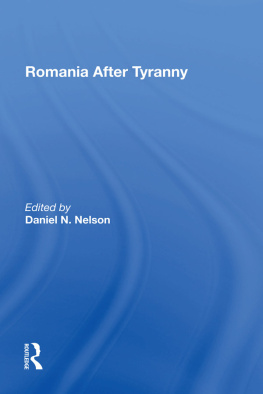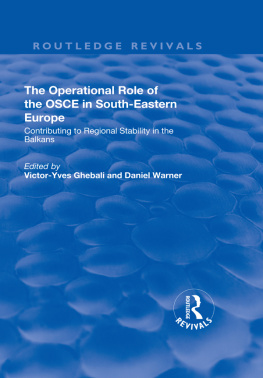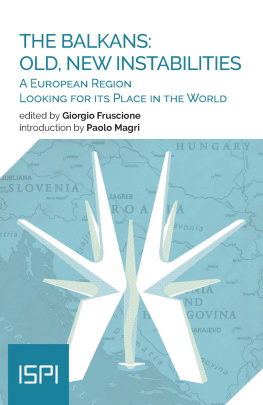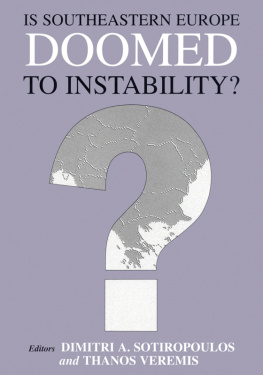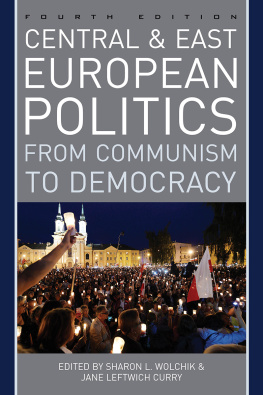Balkan Imbroglio
First published in 1991 by Westview Press
Published in 2021 by Routledge
605 Third Avenue, New York, NY 10017
2 Park Square, Milton Park, Abingdon, Oxon OX14 4RN
Routledge is an imprint of the Taylor & Francis Group, an informa business
Copyright 1991 by Taylor & Francis
All rights reserved. No part of this book may be reprinted or reproduced or utilised in any form or by any electronic, mechanical, or other means, now known or hereafter invented, including photocopying and recording, or in any information storage or retrieval system, without permission in writing from the publishers.
Notice:
Product or corporate names may be trademarks or registered trademarks, and are used only for identification and explanation without intent to infringe.
Library of Congress Cataloging-in-Publication Data
Nelson, Daniel N., 1948
Balkan imbroglio : politics and security in southeastern Europe /
Daniel N. Nelson.
p. cm.
Includes index.
ISBN 0-8133-7956-3
1. Balkan PeninsulaPolitics and government1989 . 2. Balkan
PeninsulaForeign relations1989 . I. Title.
DR48.6.N45 1991
949.6dc2090-29096
CIP
ISBN 13: 978-0-3670-1482-7 (hbk)
ISBN 13: 978-0-3671-6469-0 (pbk)
DOI: 10.4324/9780429044687
Contents
1 Security in the Balkans
Multilateral Effects on Balkan Domestic Politics and Foreign Policies
The Soviet Union and Southeastern Europe
Military Doctrine
Regional Security Issues
Conclusion
Notes
2 The Yugoslav Precipice
Federalism to Confederalism to Nationalism
Economic Paralysis
Potent Nationalism
Yugoslav Strengths
Implications for Western Policy
Notes
3 New Politics and the Army in Bulgaria
Propellants of Change
The Army and Bulgarias Transitions
Notes
4 No Longer Tyranny, Not Yet Democracy: Romanias Perilous Path After Ceausescu
Background
Electoral Outcomes
Post-Electoral Unrest and Western Responses
Conclusion
Notes
5 Turkish Uncertainties: Domestic and Foreign Policy Identities in the 1990s
Introduction
Domestic Policies
Turkey and Strategic Realignment
Notes
6 Athenian Questions
The Political and Economic Quagmire
Greek Foreign Policy Adjustments
Summary
Notes
Conclusion: Balkan Pasts, Balkan Futures
Balkan Futures
Notes
- 1 Security in the Balkans
- Multilateral Effects on Balkan Domestic Politics and Foreign Policies
- The Soviet Union and Southeastern Europe
- Military Doctrine
- Regional Security Issues
- Conclusion
- Notes
- 2 The Yugoslav Precipice
- Federalism to Confederalism to Nationalism
- Economic Paralysis
- Potent Nationalism
- Yugoslav Strengths
- Implications for Western Policy
- Notes
- 3 New Politics and the Army in Bulgaria
- Propellants of Change
- The Army and Bulgarias Transitions
- Notes
- 4 No Longer Tyranny, Not Yet Democracy: Romanias Perilous Path After Ceausescu
- Background
- Electoral Outcomes
- Post-Electoral Unrest and Western Responses
- Conclusion
- Notes
- 5 Turkish Uncertainties: Domestic and Foreign Policy Identities in the 1990s
- Introduction
- Domestic Policies
- Turkey and Strategic Realignment
- Notes
- 6 Athenian Questions
- The Political and Economic Quagmire
- Greek Foreign Policy Adjustments
- Summary
- Notes
- Conclusion: Balkan Pasts, Balkan Futures
- Balkan Futures
- Notes
Guide
As Europe underwent extraordinary changes in 19891990, the continents southeastern regionthe Balkansbegan once again to distinguish itself through ethnic rivalries, political turmoil, and interstate disputes. The recurrence of tensions and conflicts between age-old antagonists and an uncertain prognosis for stability, democracy, and well-being have fostered images of a Balkan imbroglio where there is little hope of progress and ample reason to suspect worse. From the outside the Balkans do, indeed, convey a sense of political intricacies and confusions that entangle anyone who ventures near.
This volume offers country-specific and comparative assessments of principal political trends during such a transitional era. The contents were written in the midst of significant regional and indigenous changes and reflect the dynamism of the period. I have made no effort to survey the entire range of events from Yugoslav to Turkish politics, but concentrate instead on matters of international security, socioeconomic policy, and political leadership. I focus, in other words, on the most visible part of the political spectrum during this turbulent era, anticipating that readers will pursue additional sources for detailed consideration of nuances in each countrys domestic scene. Although I have been drawn toward the unfolding of events in 19891990, I am concerned as well about theoretical issuesabout the requisite conditions for democracy, the role of the military in a civil society, and the manner in which security can be achieved other than from an overarching multilateral alliance.
I have been aided in the production of this book by the staff at the Carnegie Endowment for International Peace, where I was a senior associate during 1990. Liz Jasper was an exceptionally able administrative assistant, and Tom Pere, Jackie Merl, Julie Baumgarten, and Andy Howard served as researchers on various aspects of this project.
first appeared in the Spring 1990 (#19) issue of The National Interest, Washington, D.C.
Doiel N. Nelson
Washington, D.C.
DOI: 10.4324/9780429044687-1
The Balkans is a term connoting peoples, cultures and states that make up a peninsula of Southeastern Europe between the Black, Adriatic, Aegean and Mediterranean seas. The Balkan Mountains are at the heart of this region, running a few hundred miles from eastern Yugoslavia through Bulgaria. To the north and northwest, however, the boundary of the Balkans is less precise, and loudly debated.
During the latter half of the twentieth century, the post-World War II boundaries of Romania and Yugoslavia have been taken as the northern extent of the Balkan region. The Austro-Hungarian Empire, of course, earlier had controlled Slovenia and Croatia (since 1918, republics of Yugoslavia), as well as Transylvania (within Romania today), making their Balkan character questionable in some ethnographic and geographic studies.
In this volume, however, I adopt a pragmatic definition, using the boundaries of the Yugoslav and Romanian states after World War II as the northern division of the Balkans from the rest of Europe, and also include the European salient of Turkey to the west of the Bosporus.
"The Balkans inspire disparaging assessments, visions of backwardness, corruption and intrigue, or (in the popular mind) Dracula and the Orient Express. Behind this facade, however, are nations and states exhibiting more substance and complexity, more capacity and depth. Thorough, scholarly histories of the Balkans reveal periods of peace and development during the past century that, had they been able to continue unimpeded, may have led to a far different environment than todays conditions. Unfortunately for the populations of the region, the emphasis of Balkan governments after gaining independence from the Turks and Austro-Hungarian Empire was on military preparedness and national expansion over internal development while fail[ing] to pay adequate attention to the concerns and interests of the peasantry or to give adequate support to the agricultural sections of their economies. The human and natural resources of the region, however, could have created a different outcome.


